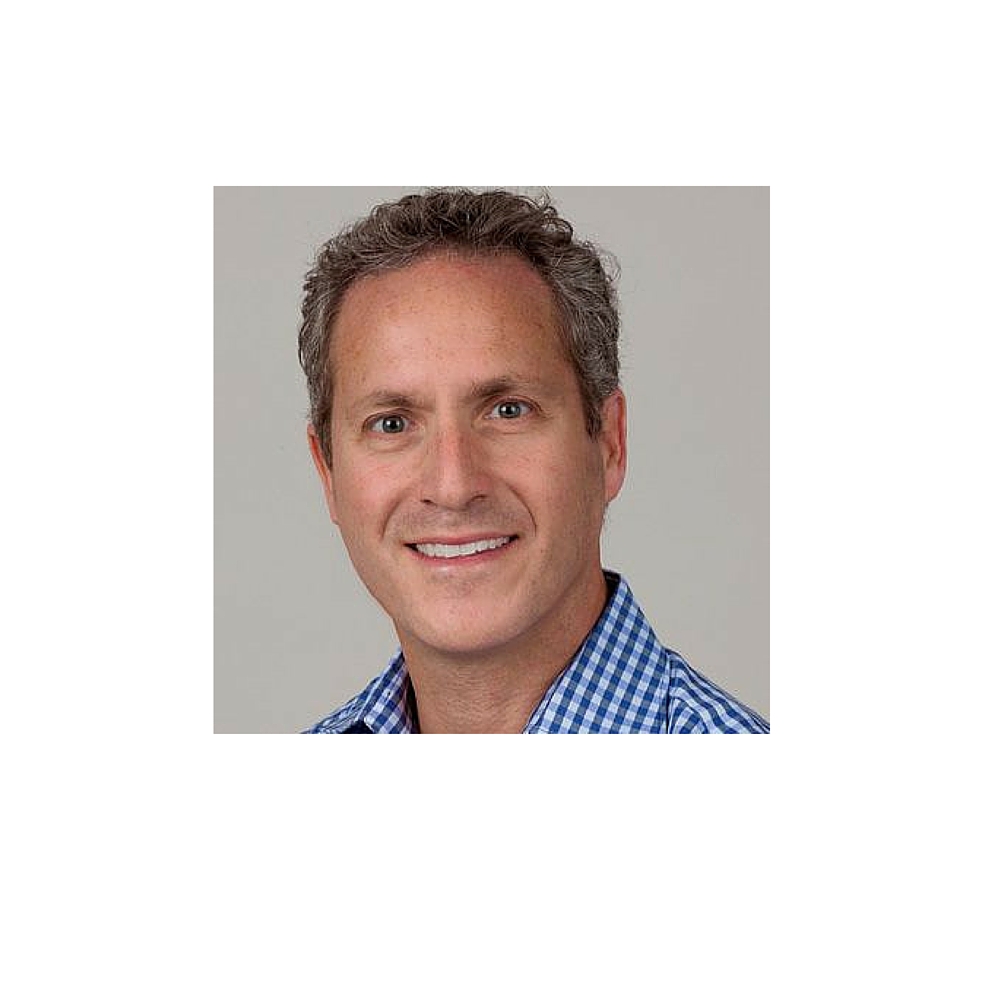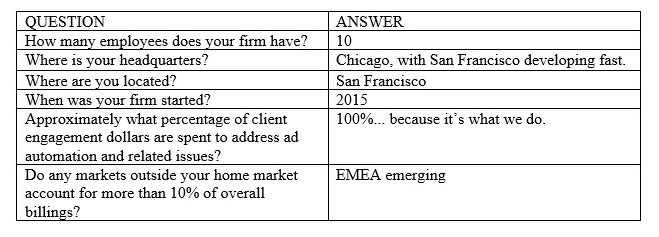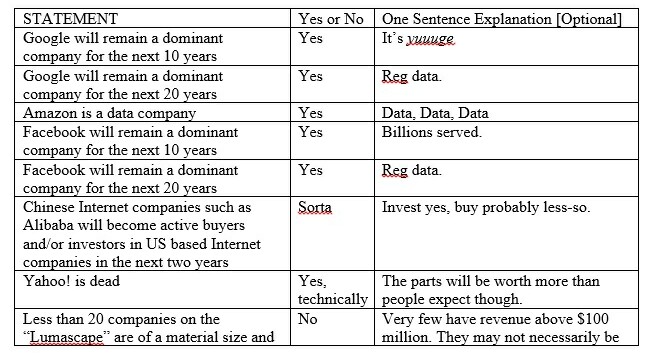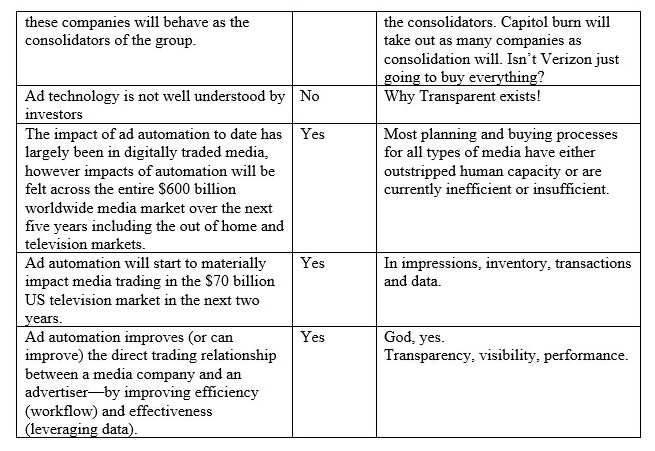Eric Bader of Transparent Media Partners -- The Ad Automation and Programmatic Confidantes

In a series of conversations with the leading confidants and consultants in the ad automation and programmatic area, Jay Sears, Senior Vice President Marketplace Development of Rubicon Project, discusses trends and issues of the day impacting advertisers and media owners. n this interview, Sears speaks with Eric Bader, partner at Transparent Media Partners. Bader has served in a variety of roles prior to Transparent, including CMO of ad tech company RadiumOne and Managing Director of Digital at MediaVest Worldwide.
(Editor’s Note: Be sure to read the first installment of this series -- Jay's interview with Jon Mandel of Dogsled Enterprises.)
Your Name:Eric Bader
Your Company:Transparent Media Partners
Your Title:Partner
SEARS: What do you read to keep up with politics, art and culture?
BADER: The New York Times, The New Yorker, Vanity Fair, Politico, ESPN the Magazine
SEARS: What do you read to keep up with friends?
BADER: Text messages, a silly amount of email
SEARS: What do you read to keep up with the advertising technology industry?
BADER: AdExchanger, Wall Street Journal, Business Insider, AdAge
SEARS: What’s your favorite commercial of all time?
BADER: Can’t be just one. Dos Equis: Most Interesting Man in the World, Old Spice: The Man Your Man Could Smell Like and Sony: The Super Balls spot.
SEARS: With regards to advertising automation, what are the three biggest trends you expect to impact companies in 2016?
BADER:
- Transparency of fees, methodologies and measurements
- Operationalizing marketing automation to realize the performance benefits
- Identifying and implementing unified, simplified and compatible platforms.
SEARS: With regards to advertising automation, what are the three most overblown topics that you wish would just go away?
BADER:
- IoT strategy
- Viral strategy
- Mobile-first strategy
Does anybody know what a strategy actually is??
SEARS: Describe your firm and then tell us the three most common issues you help clients on with respect to advertising automation and programmatic trading.
BADER: Transparent is an objective buy-side advisor that helps brand marketers understand the full range of costs, regain control of their data and restore their media investments back into working media. We help them navigate the vast, complicated landscape of marketing technologies to choose compatible technology systems and then implement and operationalize them to increase their marketing performance.
The three most common issues are:
- The need for brand marketers to control, centralize and activate their own data
- Lack of transparency and efficiency in marketing technologies and operations
- Visibility into and understanding of how to select new marketing technology systems

SEARS: What are the most common issues you help clients on regarding automation?
BADER:
- Data: Separating the signals from the noise, understanding costs and taking control
- Activation: Architecting compatible systems that will impact ad performance
- Independence: Freedom from rev-share influence, arbitrage, rebates, kickbacks, volume bonuses -- all the things that siphon media dollars away from working media.
SEARS: The majority of ad technology companies have struggled (relatively small, unprofitable or both). Of the poor performers, what are the commonalities between them that have contributed to this weakness?
BADER: Mis-playing the managed service and self-service platform opportunities. Mixed priorities for selling through agencies and going direct to clients. Mobile as an after-thought. Low R&D spending.
SEARS: A smaller handful of ad technology companies has achieved scale and performed better than the rest. What are the commonalities between them that have contributed to this relative strength?
BADER: Relatively transparent operations. Clear go-to-market strategies with tech investments to support them. Not trashing their margins to grab revenue and market share.
SEARS: Do we live in a “tale of two cities” where Google and Facebook win almost everything, advertisers are dictated to and other media companies fight for the scraps?
BADER: Yeah, pretty much. But, publishers and media owners need to take back the share that GOOG and FB can’t serve as well or efficiently and there’s more of that than may be apparent. That said, there are still billions moving though the rest of the ecosystem. The game’s not over (but hurry up).
SEARS: Please answer the following statements yes or no.
BADER:


SEARS: If you could go to the airport right now with friends or family and fly anywhere in the world for vacation, who would you take and where would you go?
BADER: Meribel, France, which means skiing the three valleys: Meribel, Val d’Isere and Tignes all at once.
SEARS: If you could create an endowment to fund any existing non-profit you designated, what lucky non-profit organization would that be?
BADER: Not a specific non-profit by name, but I am totally in support of developing literacy, making college accessible and affordable, providing valuable job skills and enforcing human rights.
SEARS: What is your favorite restaurant in the world?
BADER: The Spotted Pig. Bonus: The best meal I ever had was in some place in Jerusalem that I’ll never remember the name of.
SEARS: Thanks, Eric!
(Editor’s Note: Do know a leading ad automation consultant in the ad automation and programmatic area advising advertisers and media companies that Sears should consider interviewing? Tell him here.)
The opinions and points of view expressed in this commentary are exclusively the views of the author and do not necessarily represent the views of MediaVillage.com/MyersBizNet management or associated bloggers.


